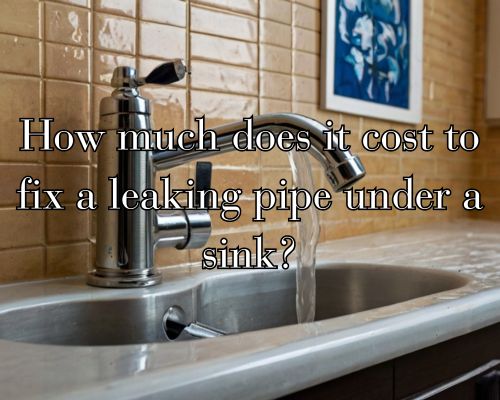If you have a leaking pipe under your kitchen sink, you may be wondering how much it will cost to fix. The cost of repairing a leaking pipe can vary depending on the severity of the leak and the required repairs.
In this article, we will break down the factors that can affect the cost of fixing a leaking pipe under your sink.

One of the factors that can affect the cost of fixing a leaking pipe is the location of the leak. If the leak is in a hard-to-reach area, such as behind a wall or under the floor, the repair may be more complex and time-consuming, which can increase the cost.
Additionally, the severity of the leak can also impact the cost. A minor leak may only require a simple repair, while a major leak may require more extensive repairs or even a replacement of the plumbing system.
If you are not experienced in plumbing repairs, it is recommended that you hire a licensed plumber like Plumbers Warragul to fix the leak. A plumber will have the knowledge and experience to diagnose the problem and provide an accurate estimate of the repair costs.
In the next section, we will discuss the average costs of fixing a leaking pipe under a sink, based on industry data and research.
Identifying the Source of the Leak
Assessing the Damage and Location
The first step in fixing a leaking pipe under your sink is to identify the source of the leak. Start by examining the area under the sink for any signs of moisture or water damage.
Check the walls, floors, and ceilings around the sink for any signs of water damage. If you notice any water stains or wet spots, it’s likely that there is a leak under the sink.
Next, turn off the water supply to the sink and open the faucet to drain any remaining water from the pipes. Use a towel or bucket to catch any water that may still be in the pipes.
Once the pipes are drained, inspect all of the plumbing fixtures under the sink, including the drain pipe, P-trap, washers, gaskets, and O-rings. Look for any signs of corrosion, loose connections, or damage to the fixtures.
Common Causes of Leaks Under the Sink
There are several common causes of leaks under the sink. One of the most common causes is a loose connection between the faucet and the water supply line. If the connection is loose, water can leak out and cause damage to the surrounding area.
Another common cause of leaks under the sink is a damaged P-trap. The P-trap is the curved pipe that connects the sink drain to the main drain line. If the P-trap is damaged or becomes clogged, water can leak out of the sink and cause damage to the surrounding area.
Other common causes of leaks under the sink include damaged washers, gaskets, and O-rings, as well as corrosion on the plumbing fixtures. If you notice any signs of damage or corrosion, it’s important to replace the damaged parts as soon as possible to prevent further leaks and water damage.
In some cases, the source of the leak may be more difficult to diagnose. If you’re unable to locate the source of the leak, it may be necessary to call a professional plumber to diagnose and repair the problem.
Repair and Replacement Options
When to Call a Plumber
If you have a leaking pipe under your sink, you may be tempted to try to fix it yourself. However, it is important to know when to call a plumber.
If you are not experienced with plumbing jobs, it is best to call a plumber like Plumbers Warragul to avoid making the problem worse. Additionally, if the leak is severe or if you do not have the necessary tools, it is best to call an experienced plumber.
In an emergency plumbing service, a plumber will be able to assess the situation and determine the best course of action. They will have the necessary experience, equipment, and materials to fix the leak or replace the pipe if necessary.
Cost Factors for Fixing Leaks
The cost of fixing a leaking pipe under a sink can vary depending on a number of factors.
Some of the factors that can affect the cost include the severity of the leak, the age of the plumbing system, and the type of pipe that needs to be replaced.
If the leak is severe, it may require an emergency plumber, which can increase the cost. Additionally, a corroded or broken shut-off valve may need to be replaced, which can also increase the cost.
The cost of a plumber can also vary depending on the plumber’s experience. An experienced plumber may charge more than a less experienced plumber. Some plumbers may also charge a call-out fee, which can also increase the cost.
When it comes to pipe replacement, the cost can vary depending on the type of pipe that needs to be replaced.
For example, copper pipes can be more expensive than PVC pipes. The cost of materials and equipment can also affect the overall cost of the repair or replacement.
